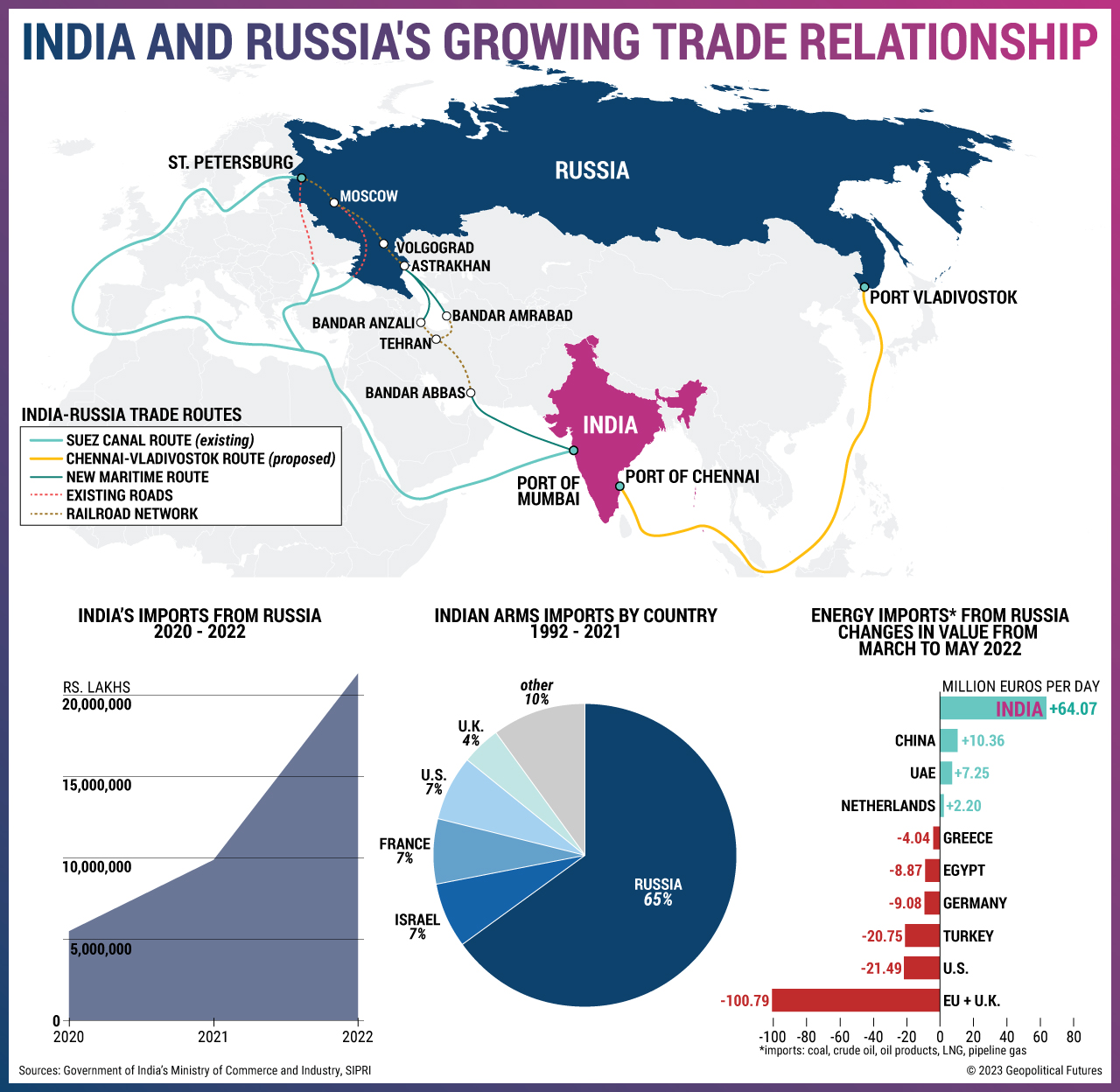


As tensions between Russia and Ukraine continue to escalate, the long-standing relationship between India and Russia has been put under close scrutiny. Indian Minister of External Affairs Dr S Jaishankar recently gave a speech at the Asia Society Policy Institute in New York City, highlighting the three key aspects of this relationship: geopolitics, trade, and military partnership. Jaishankar emphasized the importance of this partnership for both countries, especially in terms of addressing external hostile forces. With the Eurasian region being a major global player, the ties between India and Russia have a significant impact on the stability and productivity of both nations.
India's Delicate Balance: Navigating the Russia-Ukraine Divide
India's relationship with Russia has been a subject of intense scrutiny since the outbreak of the Russian-Ukrainian conflict. As a longstanding ally of Russia, India finds itself in a precarious position, balancing its historic ties with Moscow against the growing international pressure to condemn the Russian invasion of Ukraine.
Historical Context
The India-Russia relationship dates back to the Soviet era and has been characterized by close diplomatic, economic, and military cooperation. India relies heavily on Russian arms imports, while Russia views India as a key strategic partner in the Indian Ocean region.
Geopolitics
Minister of External Affairs Dr. S. Jaishankar has emphasized the geopolitical significance of the India-Russia partnership. India views Russia as a counterbalance to China, its primary rival in the Asian region. Russia, in turn, benefits from India's neutrality in the Russia-West standoff.
Trade
Trade between India and Russia has grown steadily in recent years. Russia is one of India's largest oil suppliers, while India exports pharmaceuticals, machinery, and other goods to Russia.
Military Partnership
India and Russia have a long-standing military partnership. Russia has been a major supplier of arms to India, including fighter jets, submarines, and missiles. The two countries also conduct joint military exercises and collaborate on defense research.
India's Response to the Ukraine Conflict
India has taken a cautious approach to the Russian-Ukrainian conflict. It has abstained from voting on UN resolutions condemning Russia's actions and has refused to impose sanctions on Moscow. India's position is driven by several factors:
Top 5 FAQs
Q1: Why is India not condemning Russia's actions in Ukraine? A1: India is trying to maintain its neutrality in the conflict and balance its relationships with both Russia and the West.
Q2: Will India impose sanctions on Russia? A2: India is unlikely to impose sanctions on Russia, given its heavy reliance on Russian arms and energy.
Q3: What is the future of the India-Russia partnership? A3: The future of the partnership is uncertain. The conflict in Ukraine has put pressure on India to distance itself from Russia.
Q4: How will the conflict affect India's security? A4: The conflict could lead to increased tensions between Russia and NATO, which could indirectly impact India's security.
Q5: What is India's role in mediating the conflict? A5: India has offered to act as a mediator between Russia and Ukraine but has so far played a limited role in diplomatic efforts.

The US and Australia have signed a deal to boost cooperation on rare earths and critical minerals, with the goal of reducing dependence on China. Australian Prime Minister Albanese has pledged to invest billions in crucial projects in the next six months as part of the agreement. Trump also emphasized the importance of the Aukus defense pact with Australia and the UK, stating that it serves as a deterrent against China. The deal is now moving forward quickly, with only minor clarifications left to be made.

Top US officials, including Vice President JD Vance and Secretary of State Marco Rubio, have spoken out against the Israeli parliament's vote to annex the already-occupied West Bank. Vance called the vote a "stupid political stunt" that could harm ongoing efforts towards a ceasefire and peace deal. Rubio warned that the move could jeopardize President Trump's plan to end the conflict. Despite the Knesset's approval, both officials reiterated that it is not the policy of the US to support annexation of the West Bank by Israel.

Pannir Selvam, a 28-year-old Malaysian man, received the death sentence in Singapore after being convicted of drug trafficking. Pannir's family, who remember him as a playful and talented musician, were shocked to hear of his arrest and have been fighting for his release ever since. With Singapore's strict laws against drug trafficking, Pannir's fate now lies in the hands of the court.

The FBI announced the arrest of Cindy Rodriguez Singh, one of its 'top 10 most wanted fugitives', from India in connection with the murder of her six-year-old son. She was charged with Unlawful Flight to Avoid Prosecution and Capital Murder. Patel commended the Indian and US agencies for their coordination in the case and noted that this is the fourth '10 Most Wanted' fugitive arrested in the past seven months. Singh's son had severe health and developmental issues and she allegedly fled to India to avoid prosecution, but justice knows no borders and the FBI never gives up on those who harm the innocent.

In a significant move, the descendants of Netaji Subhas Chandra Bose have urged Prime Minister Narendra Modi to institute a tradition of hoisting the National Flag at the Red Fort every year, to commemorate the establishment of the Azad Hind Government on October 21. The Azad Hind Government, formed under Netaji's leadership, played a key role in the fight for India's independence during World War II. With the 82nd anniversary of its establishment approaching, this request holds even more significance in honoring the sacrifices made by the Azad Hind Fauj.

Prime Minister Narendra Modi spent Diwali in an unconventional manner, celebrating the festival of lights with Indian Navy personnel onboard the aircraft carrier INS Vikrant. During his visit, Modi praised the INS Vikrant as a symbol of Aatmanirbhar Bharat and also witnessed a stunning air power demo by MiG 29K fighter jets taking off and landing on the short runway of the aircraft carrier. Modi was also deeply moved by a special cultural performance by the sailors, dedicated to the success of the Indian Armed Forces. He ended the evening by joining in the tradition of Bara Khana with the naval personnel. On the next day, Modi joined a yoga session on deck and watched a spectacular steampast of warships and flypast by aircraft.

Indian Prime Minister Narendra Modi celebrated Diwali with Navy personnel on the country's new aircraft carrier, INS Vikrant. He extended Diwali greetings to the nation and shared highlights from his visit, including an air power demonstration and cultural program. PM Modi also addressed the significance of Diwali and expressed his best wishes to the families of the Navy personnel.

In a tense meeting at the White House, President Donald Trump urged Ukrainian President Volodymyr Zelensky to accept Russian President Vladimir Putin's terms for ending the two-year war in Ukraine. Despite seeking more military support from the US, Zelensky was met with resistance from Trump, who reportedly engaged in a "screaming match" with the Ukrainian leader. The US leader even claimed that Putin saw the conflict as a "special operation" rather than a full-fledged war, further complicating negotiations between the two nations.

As Liverpool struggled to find their form in a tough game against Manchester United, Dutch midfielder Cody Gakpo stood out with his sharp attack and strong composure. Despite hitting the woodwork three times, Gakpo managed to score a brilliant equalizer for his team, showcasing his potential and talent on the field. While Liverpool may have lost the match, Gakpo's impressive performance provided a glimmer of hope for a struggling team.

Ayodhya's Deepotsav 2025 was a shining example of faith, community, and innovation as the city set two new world records with over 26 lakh diyas and a grand aarti performed by 2,100 priests. The event, witnessed by Chief Minister Yogi Adityanath, also showcased a spectacular 3D projection mapping and drone light show that brought Lord Ram's story to life in the night sky. The event was a testament to the deep connection Ayodhya's youth have with Lord Ram's ideals and was made possible by the hard work of over 40 potter families and thousands of volunteers.